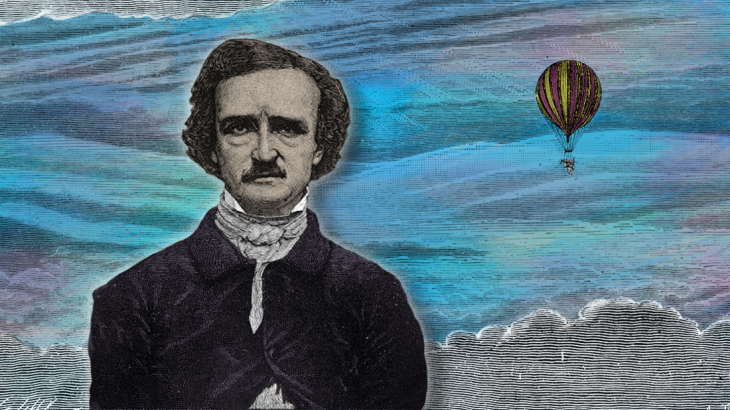
Perceptions of Poe
Julia Joyce
I am going to take a page out of Edgar Allen Poe’s book and tell you that you do not want to read this blog post. It is boring, and you hopefully have better things to do with your life. Poe begins his essay “Mellona Tauta” with the author of the salvaged letter saying that if he has to be bored because he is confined to a hot air balloon, then so does the reader. So fair warning, this post will not be much better than a cooped up, bored, lonely man’s writings that were found inside a bottle and pulled out of the sea.
Poe is known for his haunting, dark, and deep writings like “The Fall of the House of Usher”, “The Raven”, and “The Tell-Tale Heart” just to name a few. He writes about death and darkness frequently, but did you know he wrote not one, but two essays about hot air balloons? One I already mentioned, and it features some element of time travel because the letter that was retrieved was written in the future, but there is no explanation for how it is found in the past in the essay. The other essay is “The Balloon Hoax” and basically Poe convinces a whole lot of people that a group has crossed the Atlantic Ocean in a hot air balloon in just three days, but the whole essay that was published in a newspaper was fictitious. Of course, Poe does not say the article is fake news. Poe may be famous for his darker works, but he also had a sense of humor and includes creative aspects in his stories. I cannot in good conscience recommend either of the essays because they are boring like the author described (in the second essay very long and precise descriptions of the phony balloon are involved), but it does give us another dimension to Poe that at least my high school English class did not cover. I mean would you ever have imagined Poe, writing from a futuristic point of view, saying that early humans (i.e. us) were cannibalistic and therefore Lord Cornwallis (a wealthy dealer in corn) was surrendered for sausage?
Something else that is probably not well known about Poe is that he is credited with the first detective story, “The Murders in the Rue Morgue” (well apparently that is kind of up for debate so to be safe we will just say he was one of the first). It may not be up to the standards of Law and Order, Criminal Minds, NCIS, Sherlock, and various other crime fighting televised series that our culture is saturated with, but it is much more entertaining than reading about hot air balloons that did not actually exist. There is a creative plot twist that makes the story worth reading. This story deserves respect because it was one of the first of its kind. Today everyone is writing detective stories, but no one (mostly no one?) was writing them then. Poe was ahead of the trend.
The lesson to be learned in this is that Poe was multitalented. Everyone only attributes the works that made him famous to him, but he wrote a lot outside of the narrow window we typically credit him with. Reading his less popular works gave me more of an appreciation for Poe because writing in different genres is not easy and each one has its own set of rules and expectations. Take that from someone who is used to writing research papers and is now trying to write blog posts, memoirs, and profiles, etc. Poe was not just excellent in one area, but he was talented as a whole. It’s also important to know that he has a sense of humor and is the type of guy to write an incredibly detailed article just to trick the people who read it.
People are never just one thing. Most people have many dimensions and layers. Try not to assume you know who a person is just because you have seen one facet of who they are.
2 comments
It is amazing how we can look at a writer, artist, photographer, or person in general and just label them as their primary skill. Poe is mostly seen for his creepy poems and short stories; Flannery O’Connor is mostly recognized for her shocking short stories; however, both of these writers have written other types of stories, essays, reviews, and commentaries. The same could go for any other type of artist today. And isn’t it odd how when someone decides to choose a different path than what they have been on, they are looked down on? Take for instance Taylor Swift (I know, controversial topic): she began as a country artist and then later decided to change to a pop artist. People were appalled. How dare she change her label! But why does a label of what we do define us? Shouldn’t our definition come from something higher than something we merely do on earth?
I really like how you started this post! The comment about how boring it was going to be is, honestly, the main reason I wanted to read it. This being said, I think that it was genius for Poe to write those super boring stories about the balloons. I didn’t want to read them once I got into it, but the humorous beginning gave me hope for the rest of the writing. I agree that Poe was a very dynamic and talented writer, which is something that I would definitely strive to be. I just personally would not write multiple essays on the most boring mode of transportation I could think of.